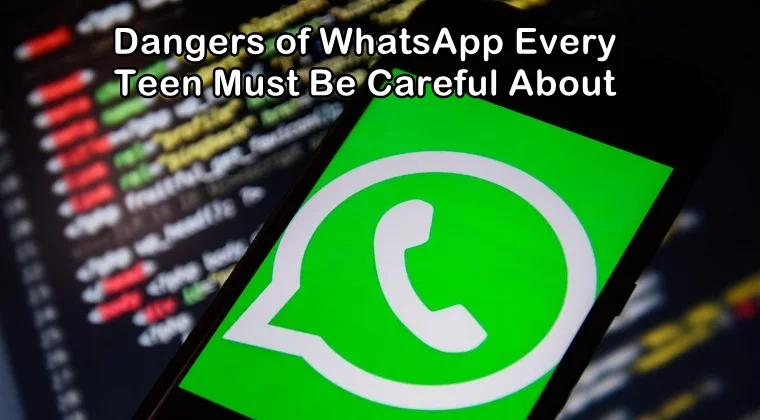Dangers of WhatsApp Every Teen Must Be Careful About

Many parents assume that WhatsApp is a safe instant messaging app. They usually consider Facebook, Snapchat, and Instagram dangerous for their kids. What they do not realize that WhatsApp can be equally harmful to teens.
Just because it’s a private messaging app that encrypts all its conversations, we cannot assume it is really private and safe for teens. This messaging app poses some significant threats to users, especially teens who frequently use the app.
In this post, we will highlight some of the unknown and less-discussed dangers of WhatsApp that every teen should be careful about. Let’s discuss those dangers and understand how teens can avoid them.
Dangers of WhatsApp Teens Should Know About
WhatsApp was one of the messaging apps that guaranteed users’ privacy when it was launched. However, things started to change when it was acquired by Facebook in 2014. WhatsApp’s founder was concerned about users’ privacy but things were no more in his hands after Facebook acquired his app.
Since Facebook heavily paid attention to collecting and selling users’ data on its other sites and apps, it started doing the same with WhatsApp. After the acquisition, Facebook began to undermine users’ privacy on the messaging app. That is when WhatsApp became exposed to several threats, dangers, and scams. Let’s discuss some dangers of WhatsApp that every person, especially teen, should know about.
Fraud and Fake News
In the past few years, it has been observed that WhatsApp constantly succumbs to fraud and fake news. In India, WhatsApp has been under the government’s radar for spreading fake news and misinformation among users.
Group chats on WhatsApp are the platform where more than 250 people can come together at a time to exchange information. With so many people in a group at the same time, it is easy for that information to go viral quickly, even if it is fake news or false information.
Teens are usually part of the WhatsApp group chats where they can send and receive information with one another. When a teen spreads wrong information about another teen or shares private photos/videos belonging to them, it is likely to go viral quickly in the WhatsApp group chat. The victim may receive embarrassing and hurtful messages individually from everyone on the app due to the misinformation spread about them by the teen bully.
The only way to curb the spread of fake news and misinformation is to stay away from these harmful group chats on the app. It is better to avoid being a part of WhatsApp groups that exchange fake news and spread misinformation about someone or something.
Malware Threats
Another danger of WhatsApp that every teen should be aware of is the malware threat on the app. Most teens are often found receiving malware threats in the form of an infected link or file in WhatsApp messages.
Recently, a new malware threat known as Agent Smith has come into the light that alters WhatsApp and replaces it with a harmful update that serves ads. This particular malware hides its icon on the phone screen and can pretend to be WhatsApp only to serve ads.
That way the malware can use the victim’s device to send money back to the online hackers in the form of a typical pay-per-click system. The best way teens can avoid such kind of malware is to download and install apps and services only from authentic sources.
Backup Messages Are Not Encrypted
WhatsApp has always been vocal about the built-in end-to-end encryption it provides to all the conversations sent and received on the app. This encryption method ensures that only the user and the person they are communicating with on the app can read what’s sent.
However, this encryption fails to work if the user is storing the data as a backup on Google Drive. Therefore, teens should always be mindful of the conversations they are having on the app and should remember that the backup messages they are storing on Google Drive are not encrypted.
If parents are concerned about their teens’ privacy on the app, they can use a WhatsApp spy app to monitor the conversations they are having with others. That way they can immediately know when or if their teens are receiving any harmful or inappropriate messages from someone.
WhatsApp Status is Not Private
There is a status feature on WhatsApp that has been inspired by the one on Instagram. Using this feature, the users can share their statuses (just like stories on Instagram) with their phone contacts. Teens should remember that the statuses being shared on WhatsApp are basically shared with all their phone contacts. Also, not all their phone contacts are their friends and family members.
Any person who has their phone number can see their status on the app. The good news is that WhatsApp allows its users to control who can see their statuses. The only downside to this restriction is that if a teen has a huge contact list then it becomes a difficult task to pick and choose contacts they want to share or not share their WhatsApp status.
Teens should be aware of these WhatsApp dangers and should know how to protect themselves against these risks. Parents should know what their teens are doing on the app. They should install a WhatsApp spy tool on their teens’ smartphones to keep track of their WhatsApp messages.
Knowing what your teens are doing on their cell phones can enable you to help them make better and safe choices. Also, knowing everything about the messaging and social media apps your teens are using can enable you to understand the risks associated with these apps.
In our opinion, Mobistealth is the best WhatsApp spy tool. It tracks all the incoming and outgoing messages exchanged on WhatsApp and transports to your online user dashboard. You need to sign in to your account using Mobistealth login details and remotely view the recorded WhatsApp messages of your kids.








